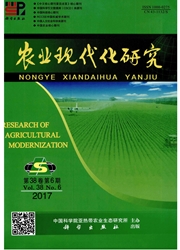

 中文摘要:
中文摘要:
运用2004-2013年31个省级行政区农村环境相关数据,构建农村环境质量评价体系,利用ESDA-GIS探究时空分异规律,再运用门槛回归模型探讨农村经济发展与环境质量的门槛效应。结果表明,我国农村环境质量存在明显时空分异特征:时间上,近10年来我国农村环境质量综合评价指数由2004年的51.01上升至2013年的52.89,可见我国农村环境质量总体改善,且东部及南方部分经济发达地区近年农村环境质量改善效果显著;空间上,我国农村环境质量自东向西趋好,存在空间集聚性,北方农村环境质量普遍优于南方。此外,我国农村环境质量与农村经济发展存在门槛效应:农业发展水平对我国农村环境质量的影响呈先负向相关后正向相关的双重门槛关系;工业发展水平负向影响农村经济,跨过门槛值后,负向影响减小;农户收入与农村环境质量呈先负向相关,跨过门槛值后正向相关的单门槛关系。从农业发展水平、工业发展水平和农户收入3个方面来看,发展农村经济对改善农村环境质量具有显著的效果。因此,应着力围绕“生产环境绿色高效、生活环境整洁舒适、生态环境山清水秀”目标,全方位多角度重点改善我国东部及南方地区农村环境质量,并大力发展农村经济,从而全面改善农村环境质量。
 英文摘要:
英文摘要:
Based on rural environmental data of 31 provincial administrative regions in China, this paper constructed a rural environmental quality evaluation system by the ESDA-GIS model to assess the temporal and spatial differences of rural environmental quality in China and analyzed its relationship with the development of rural economy by the threshold regression model. Results show that: from the temporal perspective, the comprehensive index of China's rural environmental quality increased from 51.01 in 2004 to 52.89 in 2013, showing some improvement, especially the developed regions in southern and eastern regions. From the spatial perspective, China's rural environmental quality has spatial agglomeration. The rural environmental quality in north China is better than that in south China and the rural environmental quality is getting better from east to west. Furthermore, the environment quality in rural China has the relationship with the development of rural economy. The analysis of the dual influences of agricultural development on rural environmental quality indicated that agricultural development has some positive influences on rural environmental quality during first stage and then changed to negative influences in next stage. The level of industrial development is negatively correlated to the rural economy, but the negative effect is reduced after crossing the threshold value. Farmers' income also has negative impacts on the rural environmental quality before the threshold value but it has significant positive influences on rural environmental quality after crossing the threshold value. Furtherly, industrial development and farmers' income, and the development of the rural economy have significant effects on improving the rural environmental quality. Therefore, to improve the rural environmental quality completely and realize the goals of efficient and green production environment, clean and comfortable living environment, and beautiful and sustainable ecological environment, additional resources and
 同期刊论文项目
同期刊论文项目
 同项目期刊论文
同项目期刊论文
 期刊信息
期刊信息
